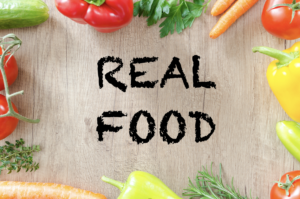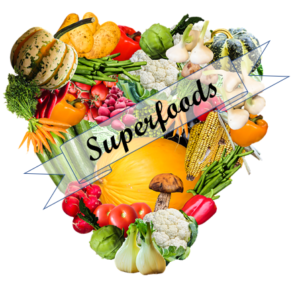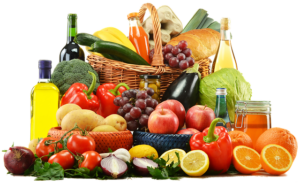 Have you noticed a resurgence in people talking about “Superfoods?”
Have you noticed a resurgence in people talking about “Superfoods?”
Google saw a huge spike in the interest of Superfoods last week. And, as we turned on the TV on Friday to catch up on the latest news, guess what was on? You got it, a segment on Superfoods!
This probably isn’t surprising, as we are all trying to figure out how to protect ourselves and our loved ones and keep everyone safe and healthy.
Can Superfoods help protect us against illness and disease, including the Coronavirus?
Superfoods has been a buzzword for many years! In fact, a few years ago, Lake Superior State University even included Superfoods on its annual list of useless, overused, or misused words.
So, what exactly is a Superfood?
 The Wikipedia definition of a “Superfood” is: “a food that is considered to be beneficial to your health and may even help some medical conditions.” So, this would explain why blueberries, salmon, kale, and flax seeds are all considered to be Superfoods. But wait… last time we checked, these are all also REAL foods!
The Wikipedia definition of a “Superfood” is: “a food that is considered to be beneficial to your health and may even help some medical conditions.” So, this would explain why blueberries, salmon, kale, and flax seeds are all considered to be Superfoods. But wait… last time we checked, these are all also REAL foods!
If a Superfood is a food beneficial to your health, shouldn’t that include ALL fruits, vegetables, whole grains, nuts, lean meats…all REAL foods?!
So why do only some REAL foods make the Superfood list?
There is no legal, scientific or medical definition of Superfoods, so it is a little bit of a free-for-all. Often, it has to do with marketing…someone developing a list of Superfoods in order to help sell something…maybe a book, a diet program, a health class or something else. If calling something a Superfood catches the eye of consumers or can create the “Superman – leap tall buildings in a single bound” perception in the back of our minds, then perhaps this will help sell whatever they have to offer.
A positive is this can be a way to help people enjoy more REAL food! If Dr. Oz tells us avocados, swiss chard and mushrooms are great Superfoods and that’s what it takes to get people motivated to include those in their diet, then that is fantastic! Including these foods in our diets hopefully forces out other foods that aren’t good for us!
While there can be positives to marketing something as a Superfood, there are also some downsides.
First, the reality is…despite what some might want us to believe, there are no miracle foods! Also, classifying something as a Superfood can lead to more confusion! It may not be clear why a particular food has achieved the elite status of a Superfood, while something not classified as a Superfood doesn’t have the same nutritional punch. Fresh-grown tomatoes (or canned tomatoes in the winter), for example, are loaded with nutritional value, but often don’t make the list as a Superfood…however, tomatoes deserve as much fame as the often-mentioned acai berries.
A few other things to consider:
- Don’t let the magic lead to bad habits! Try not to let the magic powers of Superfoods give a false sense of security (or, should we say, false sense of health). Just because someone had yogurt with Chia seeds and walnuts for breakfast and a sweet potato for lunch doesn’t mean he or she should devour an entire bag of potato chips as an afternoon snack! Have a few potato chips in moderation (or, a handful of pistachios or a bowl of popcorn would be much better), and then focus on REAL food (or Superfood) meals!
- Sky-high price? Unfortunately, the marketing buzz can drive demand up in the short-run, resulting in price increases of certain foods just because they are the most recent Superfood! Recognize when this is happening and opt for other in-season REAL foods that provide the same great taste and health benefits without the artificially inflated price!
- Don’t believe the hype! Be careful — the marketing of Superfoods can sometimes creep into the processed food world. For example, you may see packages telling you processed granola bars include a Superfood like pomegranates. Or a breakfast cereal includes a Superfood like blueberries. At the end of the day, read the ingredients, opt for REAL foods, and avoid the highly processed foods…even if they contain a small amount of a Superfood (or something resembling a Superfood).
 Wide variety is better! Rather than loading up on a small number of Superfoods, it is much better to enjoy a wide variety of REAL foods — your nutrition balance will be so much richer and imagine the variety of great-tasting foods you can try! You may end up saying “I never knew I actually liked Brussels sprouts!”
Wide variety is better! Rather than loading up on a small number of Superfoods, it is much better to enjoy a wide variety of REAL foods — your nutrition balance will be so much richer and imagine the variety of great-tasting foods you can try! You may end up saying “I never knew I actually liked Brussels sprouts!”
- Farm-fresh is best! The best Superfoods are those that are local, in season, and freshly-harvested by the farmers! While many Superfoods are marketed as part of a pill or supplement, the REAL foods in their unprocessed state are much better. The REAL foods contain the best vitamins, minerals and antioxidants, which are also absorbed much better in your body than pills or supplements.
 Have you ever wondered “what are leeks?” or “what do you do with fresh beets?” or “how do you cook fresh artichokes?” There are so many fruits, vegetables, and other REAL foods that pack a ton of nutrition and are good for us in different ways…and guess what, these are all Superfoods! Check out our extensive list of coaching tips that profile many of these “Superfoods!”
Have you ever wondered “what are leeks?” or “what do you do with fresh beets?” or “how do you cook fresh artichokes?” There are so many fruits, vegetables, and other REAL foods that pack a ton of nutrition and are good for us in different ways…and guess what, these are all Superfoods! Check out our extensive list of coaching tips that profile many of these “Superfoods!”
If you focus on natural, REAL foods, then the reality is your entire diet is Superfoods! So, avoid the hype and fads and take the opportunity to educate those who may always be looking out for the next “Superfood!”
As for the Coronavirus, there is no doubt that a healthy diet helps boost your immune system!
NOW IS THE PERFECT TIME TO DOUBLE-DOWN ON EATING A WIDE VARIETY OF REAL FOOD!
 LEARN MORE ABOUT THE NAPKIN!
LEARN MORE ABOUT THE NAPKIN!

awesome advice as ALWAYS, do this consistently and you will reap the benefits!
Thank you Leigh Anne! We appreciate you so much – and so thankful you continue to inspire others!
It really is amazing how the nutrients just take care of themselves when you eat a wide variety of REAL food! No deprivation required…many people even find themselves enjoying more food than they did before and that their meals are way more flavorful. Thanks for sharing your thoughts!